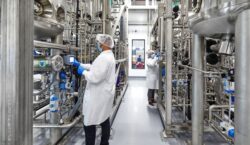Read Time: 4 Minutes Subscribe & Share
Breaking News
While I was tossing in my sleep over moving to Bologna in late July, I missed the news that Italy became the first country to ban the production and importation of synthetic foods. This ban focuses on experiments in manufacturing synthetic meat and is a point of pride for Francesco Lollobrigida, the Minister of Agriculture in Georgia Melloni’s government. He tweeted that his goal was to preserve the cultural and agricultural integrity of Italy. While I find these words admirable, I object to their application in Lollobrigida’s preference for Italians having more children rather than relying on an increase in population through immigration. His government’s food ban, however, may face legal challenges within the EU, as it confronts the “free passage of goods and services” laws set by this group of nations.
Back To The Future
You can thank Sergey Brin, the co founder of Google, for funding what’s known as “in vitro” meat technology, as he was the principal financial supporter for the successful process created by a Dutch scientific team in 2013. Not to be confused with existing plant-based alternatives, “Cultured” hamburger is, a decade later, more of a symbol than a controversial patty for sale in your grocery store meat department. So far Singapore is the only state that has approved the sale of cultured or in vitro meat. While there is some misunderstanding here in the food press about Federal approval for this process, it currently remains in the experimental stage and is not for sale to the public.
In the Netherlands, Singapore and US, investors are advancing funds for startup synthetic meat plants, even though no expert in this new frontier of food knows if synthetic meat products can be “scaled up” for mass production. It’s impressive that well over a hundred countries have various startups in this field, and millions have been invested. Italy, apparently, is not going to have skin in the game, so to speak.
Lots of emotional and political rhetoric is swirling around this step into the unknown world of synthetic food. Critics and supporters abound in Italy and outside on the possibilities of cultured agriculture versus traditional farming. Supporters of cultured meat say that it will end inhumane industrial meat production and its contribution to air pollution. Much aspirational opinion is voiced without any scientific evidence that cultured meat will help solve the nutritional needs of an exploding global population.
In Pipes Not Pastures
 In vitro meat is not a protein substitute for purist vegetarians and vegans: a reasonably objective article in Modern Farmer, as well as a thorough report from Frontiers, outlines several positive and negative issues on this form of meat, which still requires “blood from a cow fetus in addition to cells from a live animal”. From a slice of animal tissue, the stem cells are “liberated” and then immersed in an appropriate medium (read bovine serum from a dead calf). In this environment, the stem cells can rapidly multiply into different cells such as muscle and fat. Efforts to find plant-based serums are being explored, but the mind-boggling rapid multiplication of cells in a mechanically controlled environment also may have its dangers. The process requires hormone growth promoters (not allowed in the EU) and oxygen to mimic the meat from traditional farming. Another worry is the possible unintended introduction of “dysregulated” cells, such as cancer cells. And even in carefully monitored science labs, pathogens lurk and escape.
In vitro meat is not a protein substitute for purist vegetarians and vegans: a reasonably objective article in Modern Farmer, as well as a thorough report from Frontiers, outlines several positive and negative issues on this form of meat, which still requires “blood from a cow fetus in addition to cells from a live animal”. From a slice of animal tissue, the stem cells are “liberated” and then immersed in an appropriate medium (read bovine serum from a dead calf). In this environment, the stem cells can rapidly multiply into different cells such as muscle and fat. Efforts to find plant-based serums are being explored, but the mind-boggling rapid multiplication of cells in a mechanically controlled environment also may have its dangers. The process requires hormone growth promoters (not allowed in the EU) and oxygen to mimic the meat from traditional farming. Another worry is the possible unintended introduction of “dysregulated” cells, such as cancer cells. And even in carefully monitored science labs, pathogens lurk and escape.
Some view in vitro meat as at the very least a good solution to the proliferation of fast food protein and perhaps a way to curtail the horrors of CAFOs. It can be made to taste good with the right combination of salty and sweet, juiciness, tenderness etc. without the pollution and waste that industrial farming systems wreak. But there could be a massive increase in carbon dioxide proliferation if in vitro meat could be scaled up to meet demand.
A Film Of The Future
 I am always curious about innovation in food ways and welcome experimentation. Cultured meat may be helpful in space exploration, for example, and in fact NASA was in the forefront of synthetic food development for its space travel programs. But shouldn’t we be focused on cleaning up the mess created by the meat-packing industry and industrial agriculture? Should we be leaning on yet another global conglomerate that controls what we eat? Post-World War II, it seemed that hybridizing seeds to produce greater harvests and using pesticides and chemical fertilizers were the answer to feeding the world. But what we have created is a vast taxpayer subsidy program in the US benefiting corporate interests in grain and corn harvests. Billionaires and hedge funds are buying up arable land as a valuable commodity (farmland is finite). And we have created a new form of serfdom in which conventional farmers are highly mortgaged and forced to buy or lease equipment, seed, fertilizers, and pesticides from three corporations. I see a greater need to improve local agriculture to feed communities, innovation in hydroponics, urban garden markets and animal husbandry. We may not yet be in the dystopian world depicted in the 1973 film “Soylent Green” but I am not convinced that manufacturing yet another type of burger or chicken nugget is really the answer to feeding the world.
I am always curious about innovation in food ways and welcome experimentation. Cultured meat may be helpful in space exploration, for example, and in fact NASA was in the forefront of synthetic food development for its space travel programs. But shouldn’t we be focused on cleaning up the mess created by the meat-packing industry and industrial agriculture? Should we be leaning on yet another global conglomerate that controls what we eat? Post-World War II, it seemed that hybridizing seeds to produce greater harvests and using pesticides and chemical fertilizers were the answer to feeding the world. But what we have created is a vast taxpayer subsidy program in the US benefiting corporate interests in grain and corn harvests. Billionaires and hedge funds are buying up arable land as a valuable commodity (farmland is finite). And we have created a new form of serfdom in which conventional farmers are highly mortgaged and forced to buy or lease equipment, seed, fertilizers, and pesticides from three corporations. I see a greater need to improve local agriculture to feed communities, innovation in hydroponics, urban garden markets and animal husbandry. We may not yet be in the dystopian world depicted in the 1973 film “Soylent Green” but I am not convinced that manufacturing yet another type of burger or chicken nugget is really the answer to feeding the world.

Kitchen Detail shares under the radar recipes, explores the art of cooking, the stories behind food, and the tools that bring it all together, while uncovering the social, political, and environmental truths that shape our culinary world.




I’m not smart enough to know what is the answer. For myself, I have become closer to being a vegetarian or pescetarian for health reasons. While I have enjoyed a plant-based hamburger, I realize it’s mainly the toppings that provide the taste.
Hello Grace,
Yes, I agree about the toppings on either, actually. I found that I really prefer vegetables to be themselves.